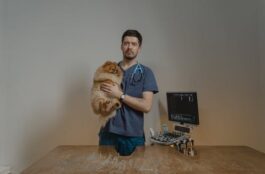
When our cuddly companions undergo surgery, a significant part of their recovery takes place in the comfort of our familiar homes. As their closest friends, it’s important that we are prepared to help them get back on their feet. Here, we’ll present some useful advice that can make the post-operative phase smoother for your pet, highlighting the crucial aspects such as pet nutrition, attending regular vet check-ups, and knowing what to do if there’s a pet emergency. With proper care and attention, our family pet can recover healthily! Remember, maintaining pet health is a journey that starts at home.
Ensuring a conducive recovery environment at Home
Even before your pet comes back from the vet, it’s vital to set up a suitable environment for their recovery. We want to make sure everything at home supports and aids their healing.
-
Quarantine: If you have more than one pet at home, it’s necessary to ensure the pet in recovery is given some space. To protect the recovering pet from any accidental harm or stress from the other pets, consider temporarily separating them. This separation can also prevent any potential infectious conditions from spreading to other creatures.
-
Comfort: To best accommodate your pet’s needs, especially after going through surgical procedures, make their sleeping and resting areas as comfortable as possible. From having soft bedding to easy access to their favorite resting spots, you want to minimize the unnecessary strain on their surgical wounds.
-
Temperature: It’s important to note that our pets can lose quite a bit of body heat after surgery. So, it’s essential to keep them in a warm environment to aid their recovery and comfort. However, always ensure that it’s not too warm as that could lead to other health risks.
To better ensure pet wellness, an integral part of preparing your home should be consulting with your veterinary clinic. They could provide some additional tips unique to your pet’s needs based on their surgery and general health state.
Maintain adherence to Veterinarian Prescriptions.
Ensuring your pet gets the full benefit of animal hospital services doesn’t end at the hospital door. Once home, the next phase of veterinary care follows – adhering to the veterinarian’s prescriptions. Remember, these prescriptions and guidelines are there to aid your pet’s recovery.
-
Medication: Administering your pet’s drugs as prescribed plays a big role in their recovery. We know it might be challenging sometimes to get the pets to swallow their medications, but it’s vital that they do. Stick to the specific intervals and doses that your vet advised. This ensures the medication works as efficiently as possible. If any side effects are noticed, speak with your vet promptly, as they might need to adjust the dosage or medication.
-
Check-ups: Post-surgery, you will have some follow-up appointments at the animal hospital or veterinary clinic. It’s incredibly important that these vet check-ups are attended as the vets are able to monitor the healing progress, make necessary adjustments to the treatment plan, and ensure there are no complications.
-
Diet: After surgery, a pet’s diet may need to change. It’s essential to follow the diet prescribed by the vet as it aids faster recovery and helps boost your pet’s strength. The right pet nutrition can provide the essential nourishment your pet needs after an operation.
Regularly Check your Pet’s Condition
Even as your pet begins to act more like themselves again, post-operation, it’s necessary to keep monitoring their condition closely during the recovery phase. This can be crucial in detecting any signs of complications early and getting them the necessary care they need.
-
Vitals: From time to time, keep an eye on your pet’s individual vitals, such as their temperature, pulse and respiration. Any abnormalities in these could be a signal of a pressing issue that needs to be addressed quickly. Basic knowledge of what’s normal for your pet can prove handy here.
-
Behavior: Changes in behavior such as appetite loss, lethargy, unexplained aggression or restlessness could be signs of discomfort or pain. It could also mean the healing process isn’t going smoothly. If you notice these signs, it’s crucial to consult your vet immediately.
-
Pet wellness: Rest is an essential part of recovery. As much as your pet is eager to return to their typical playing routines, post-operative activity must be restricted according to your vet’s advice. Gradually, as your pet heals, more activities can be reintroduced.
Understanding Pet Diagnostics
Post-operation, your veterinary clinic will conduct some pet diagnostics during the follow-up appointments. These could include blood tests, urinalysis or imaging studies such as X-rays, ultrasounds or even CT scans. These are done to better assess your pet’s health and recovery progression. If there are complications or issues, diagnostics can pick up on these early, making the treatment more effective.
An Introduction to Vet Services
In terms of pet care, modern vet practices offer a wide variety of services. This can go beyond the usual services – this could also include some unique exotic pet services. So whether you have a gerbil or a parakeet recovering from surgery, know that there are varied and specialized services to help them through their healing journey. These tailored services could include everything from specialized surgeries to unique nutritional plans and even things like one-of-a-kind pet acupuncture to help expedite your pet’s route to recovery!
Expanded Insights into Pet Care
Excellent pet care extends beyond just the basics. As much as feeding and exercising your pets regularly is vital, sometimes they require a little more, particularly after operations. Veterinarians might recommend the introduction of therapeutic treatments like pet acupuncture at Mountainaire Animal Clinic. This might sound strange at first, but pet acupuncture can help alleviate some discomfort and can definitely augment your pet’s recovery when utilized alongside other prescribed treatments.
Looking into Vet Internal Medicine
When talking about pet health, veterinary internal medicine is a significant aspect that focuses on diagnosing and treating diseases in animals non-surgically. This includes the management of chronic ailments that might not necessarily require surgical intervention. Availing of internal medicine services for your pet from trustworthy veterinary clinics will significantly help in managing any existing or potential internal illness in your pets in the post-operative phase and also in the long run.
The Value of Preventative Care for Pets
Preventive care for pets is an essential factor in maintaining their overall health. For instance, pet vaccinations are done to prime your pet’s body, proactively fighting off potential infections and diseases. Much like how we require regular health check-ups, pets need them, too. Regular vet appointments for preventive care can help detect health issues before they become a problem, and the vet can provide guidance on how to continue a preventive care regimen.
Recognizing and Responding to Pet Emergency
Post-operative complications, while rare, can swiftly escalate into a pet emergency. Therefore, it’s important to recognize the signs that something is seriously wrong and have an emergency vet’s contact ready. When minutes count, prompt and proper intervention can be life-saving for your pet.
Overall, after their surgery, our pets depend on us to support and nurture them back to good health. Proper post-operative care is essential to facilitate a smooth recovery. With a combination of home care practices, professional veterinary services and medications, including exotic pet services, pet acupuncture and internal medicine services for your pet, we can guide our furry family members through their healing process with care and knowledge.

